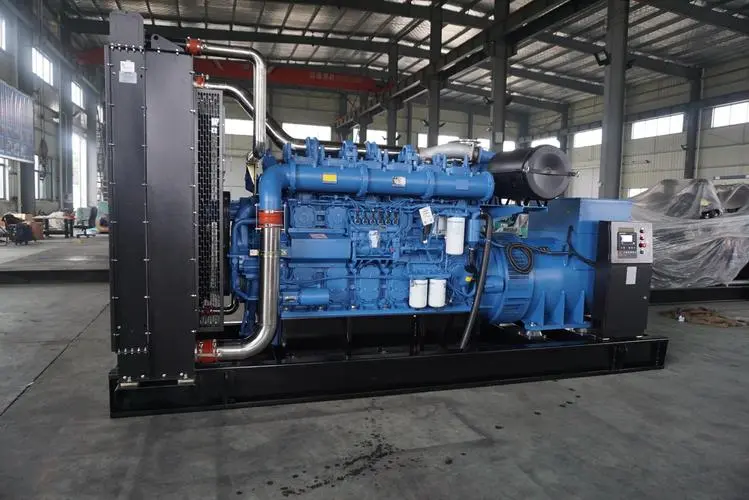Shipping and delivery options for 400kW generators have been a reliable source of power for various applications for decades. They are widely used in industries, commercial buildings, residential areas, and as backup power sources in case of emergencies. One of the key advantages of diesel generators is their ability to handle variable load demands efficiently. In this article, we will delve into the details of diesel generators, their working principle, advantages, and how they are suited for applications with variable load demands.
Understanding Diesel Generators
A diesel generator, also known as a diesel genset, is a combination of a diesel engine and an electric generator used to generate electrical energy. The diesel engine drives the generator to produce electricity through the process of electromagnetic induction. Diesel generators are available in a wide range of sizes and power capacities to cater to different requirements.
Working Principle of Diesel Generators
The working principle of a diesel generator is relatively simple yet highly efficient. When the diesel engine is started, it burns diesel fuel in the combustion chamber, producing mechanical energy. This mechanical energy is then converted into electrical energy by the generator through the process of electromagnetic induction. The generated electricity is then supplied to the connected load.
Advantages of Diesel Generators
Diesel generators offer several advantages that make them a popular choice for various applications, especially those with variable load demands. Some of the key advantages of diesel generators include:
1. Fuel Efficiency: Diesel engines are known for their fuel efficiency compared to gasoline engines, making diesel generators a cost-effective option for long-term use.
2. High Power Output: Diesel generators are capable of delivering high power output, making them suitable for heavy-duty applications and variable load demands.
3. Durability and Reliability: Diesel generators are known for their robust construction and reliability, ensuring continuous operation even in harsh conditions.

4. Easy Maintenance: Diesel generators are relatively easy to maintain, with fewer moving parts compared to other types of generators.
5. Quick Start-Up Time: Diesel generators can start up quickly and provide power within seconds, making them ideal for applications where uninterrupted power supply is critical.
Diesel Generators for Variable Load Demands
One of the key strengths of diesel generators is their ability to handle variable load demands effectively. Variable load demands refer to situations where the power requirements fluctuate over time, such as in industrial processes, construction sites, or events with varying power needs. Diesel generators are well-suited for such applications due to the following reasons:
1. Load Flexibility: Diesel generators can easily adapt to varying load demands without compromising on performance. They can efficiently handle sudden spikes or drops in power requirements, making them reliable for applications with unpredictable loads.
2. Load Sharing Capability: In scenarios where multiple diesel generators are connected in parallel to meet a higher power demand, load sharing capability ensures that the load is distributed evenly among the generators. This not only optimizes fuel consumption but also enhances the overall efficiency of the system.
3. Instant Response Time: Diesel generators have a quick response time, enabling them to ramp up or down power output rapidly based on the changing load demands. This feature is crucial in situations where immediate adjustments are required to maintain a stable power supply.
4. Overload Protection: Diesel generators come equipped with built-in overload protection features to safeguard the system from damage in case of excessive loads. These protective mechanisms ensure the longevity of the generator and prevent disruptions due to overloading.
Applications of Diesel Generators with Variable Load Demands
The versatility of diesel generators makes them suitable for a wide range of applications with variable load demands. Some common applications where diesel generators excel in handling fluctuating power requirements include:
1. Construction Sites: Construction projects often require temporary power sources to run heavy machinery, tools, and equipment. Diesel generators are ideal for construction sites due to their ability to provide reliable power for varying loads throughout the project duration.
2. Events and Festivals: Temporary events such as concerts, outdoor festivals, or sporting events require power sources that can cater to the fluctuating power needs of lighting, sound systems, and other electrical equipment. Diesel generators offer a dependable solution for such events.
3. Manufacturing Facilities: Industrial manufacturing processes often involve equipment with varying power demands. Diesel generators can ensure a stable power supply to critical machinery, even when the load requirements change during production cycles.
4. Telecommunications Infrastructure: Telecommunication towers and facilities require uninterrupted power to maintain communication networks. Diesel generators serve as reliable backup power sources for telecom infrastructure, handling variable loads effectively during power outages.
5. Remote Locations: Diesel generators are commonly used in remote areas where access to the main power grid is limited. These generators can adapt to the changing power needs of off-grid locations, providing essential electricity for operations.
Conclusion
Diesel generators play a crucial role in meeting the power requirements of applications with variable load demands. Their robust design, fuel efficiency, and ability to handle fluctuating loads make them a preferred choice for industries, commercial establishments, and emergency backup systems. Understanding the working principle and advantages of diesel generators is essential for selecting the right generator for specific requirements. By leveraging the flexibility and reliability of diesel generators, businesses and organizations can ensure a continuous and stable power supply, even in scenarios with unpredictable load demands.
